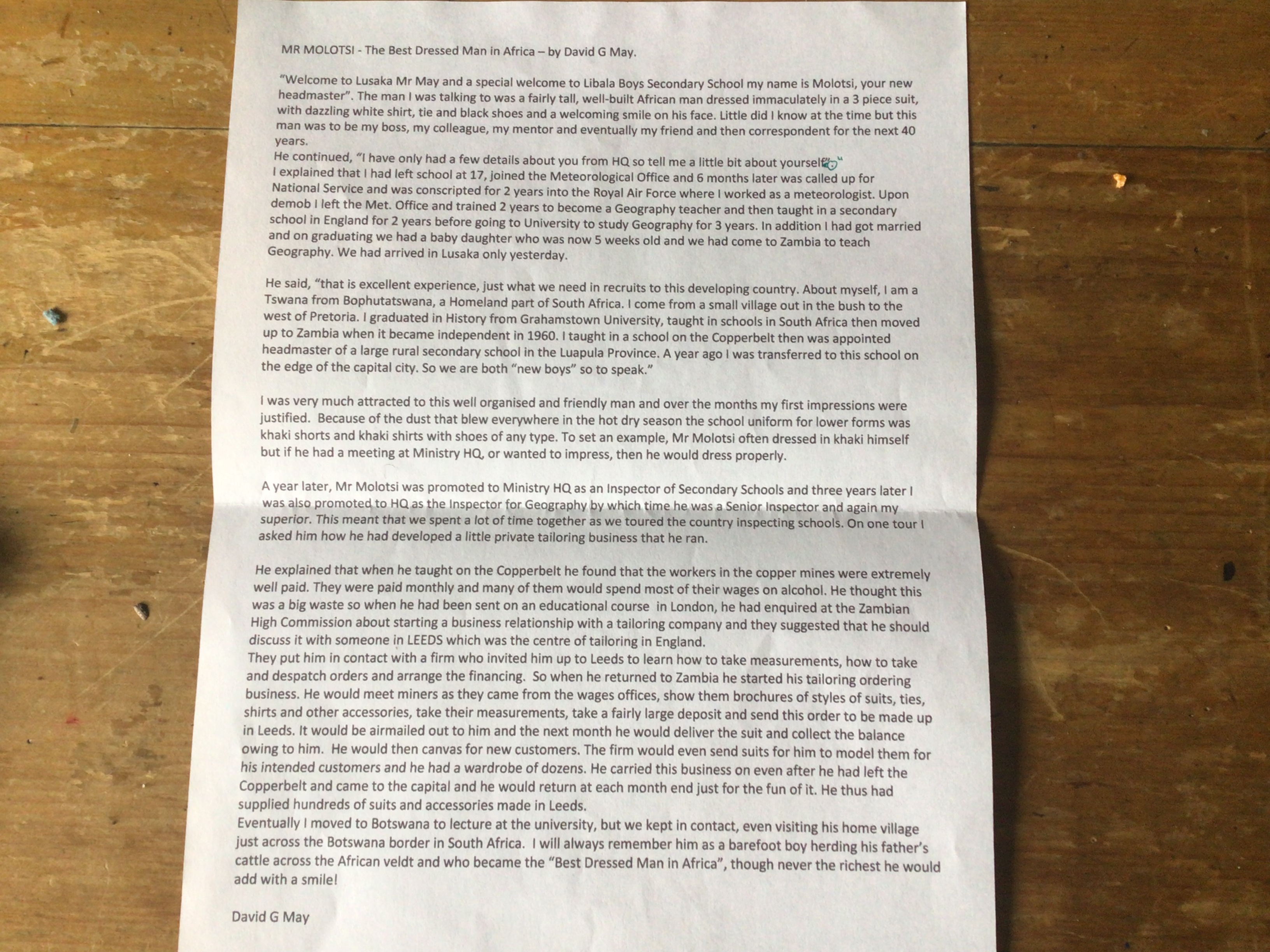David May
“Welcome to Lusaka Mr May and a special welcome to Libala Boys Secondary School my name is Molotsi, your new headmaster”. The man I was talking to was a fairly tall, well-built African man dressed immaculately in a 3 piece suit, with a dazzling white shirt, tie and black shoes and a welcoming smile on his face. Little did I know at the time but this man was to be my boss, my colleague, my mentor and eventually my friend and then correspondent for the next 40 years.
He continued, “I have only had a few details about you from HQ so tell me a little bit about yourself."
I explained that I had left school at 17, joined the Meteorological Office and 6 months later was called up for National Service and was conscripted for 2 years into the Royal Air Force where I worked as a meteorologist. Upon demob I left the Met. Office and trained for 2 years to become a Geography teacher and then taught in a secondary school in England for 2 years before going to University to study Geography for 3 years. In addition I had got married and on graduating we had a baby daughter who was now 5 weeks old and we had come to Zambia to teach Geography. We had arrived in Lusaka only yesterday.
He said, “that is excellent experience, just what we need in recruits to this developing country. About myself, I am a Tswana from Bophutatswana, a Homeland part of South Africa. I come from a small village out in the bush to the west of Pretoria. I graduated in History from Grahamstown University, taught in schools in South Africa then moved up to Zambia when it became independent in 1960. I taught in a school on the Copperbelt then was appointed headmaster of a large rural secondary school in the Luapula Province. A year ago I was transferred to this school on the edge of the capital city. So we are both “new boys” so to speak.”
I was very much attracted to this well organised and friendly man and over the months my first impressions were justified. Because of the dust that blew everywhere in the hot dry season the school uniform for lower forms was khaki shorts and khaki shirts with shoes of any type. To set an example, Mr Molotsi often dressed in khaki himself but if he had a meeting at Ministry HQ, or wanted to impress, then he would dress properly.
A year later, Mr Molotsi was promoted to Ministry HQ as an Inspector of Secondary Schools and three years later I was also promoted to HQ as the Inspector for Geography by which time he was a Senior Inspector and again my superior. This meant that we spent a lot of time together as we toured the country inspecting schools. On one tour I asked him how he had developed a little private tailoring business that he ran.
He explained that when he taught on the Copperbelt he found that the workers in the copper mines were extremely well paid. They were paid monthly and many of them would spend most of their wages on alcohol. He thought this was a big waste so when he had been sent on an educational course in London, he had enquired at the Zambian High Commission about starting a business relationship with a tailoring company and they suggested that he should
discuss it with someone in LEEDS which was the centre of tailoring in England.
They put him in contact with a firm who invited him up to Leeds to learn how to take measurements, how to take and despatch orders and arrange the financing. So when he returned to Zambia he started his tailoring ordering He business. He would meet miners as they came from the wages offices, show them brochures of styles of suits, ties, shirts and other accessories, take their measurements, take a fairly large deposit and send this order to be made up in Leeds. It would be airmailed out to him and the next month he would deliver the suit and collect the balance owing to him. He would then canvas for new customers. The firm would even send suits for him to model them for his intended customers and he had a wardrobe of dozens. He carried this business on even after he had left the Copperbelt and came to the capital and he would return at each month end just for the fun of it. He thus had supplied hundreds of suits and accessories made in Leeds.
Eventually I moved to Botswana to lecture at the university, but we kept in contact, even visiting his home village just across the Botswana border in South Africa. I will always remember him as a barefoot boy herding his father’s cattle across the African veldt and who became the “Best Dressed Man in Africa”, though never the richest he would add with a smile!
